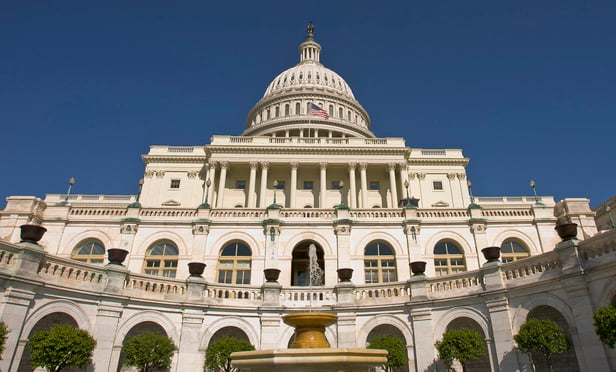 U.S. Capitol
U.S. Capitol
(Photo: Diego M. Radzinschi)
Tort reformers are pushing the most aggressive class action reform legislation in the past decade on Capitol Hill, but even defense lawyers have their concerns.
The Fairness in Class Action Litigation Act of 2017, which passed through the House Judiciary Committee this month, would impose new restrictions on who plaintiffs’ lawyers can represent, require disclosure of litigation funders and carve out the type of injuries needed to pursue class actions, among other changes. Civil rights groups and consumer advocates have criticized the legislation, and some plaintiffs’ lawyers have warned the bill’s vague language could invite more litigation.
Related Articles:
Andrew Trask, senior counsel at McGuireWoods in Los Angeles and lead contributor to the firm’s Class Action Countermeasures blog, shares at least some of their concerns. To be sure, the bill could provide some desired adjustments for defense attorneys, said Trask, who testified before the House Judiciary Committee in 2015 about a bill with the same name. But it could also invite more battles with the plaintiffs bar and, for some clients, lead to costlier settlements.
Q: Most of this bill’s provisions mimic the policy grievances of tort reformers. But what are the practical implications for those in the defense bar?
Trask: A number of the provisions will be time-savers. For example, the requirement that the plaintiffs disclose any conflicts of interest they have. That’s something we always check for in discovery but would save us huge amounts of time.
Similar with disclosing funding. It’s something I’ve always asked in discovery and interrogatories, but I’m usually stonewalled on. It would be nice to have a quick answer to that as well.
Q: Do any of these measures have unintended consequences?
AT: The largest unintended consequence may come from the mandatory appeals of class certification rulings. In any given case, clients will pressure you to appeal because they want to overturn a ruling against them. But for anyone thinking longer term, and for plaintiffs and defendants, you may not want to appeal certain rulings. I worry about what appeals would look like if there’s a requirement that the court takes any appeal. I would also worry it would bog down the courts. Class actions already are large complicated machines. It may slow things down.
Q: The 2015 bill you testified about focused on the type of injuries a plaintiff has to prove in class actions. This one mentions a similar reform, but what’s the difference?
AT: The technical term for the requirement in the 2015 bill is the “typicality” requirement, which is the one that requires the named plaintiffs have claims typical of the entire class. It’s what’s often called the “no injury” case. You’d have an injured plaintiff representing people who never suffered the same injury—and that’s what that bill was trying to get at. Somebody bought themselves a defective blender, the blender exploded, they’re one of five people it happened to, but now they’re claiming the defect affects everybody. The only language that changed is it went from the type and “extent” of injury to type and “scope,” and the reason for that was there was a huge outcry where civil rights groups and plaintiffs’ lawyers argued that “extent” would mean if one person suffered $2 and another $3, they couldn’t certify the class.
Q: Critics have said that many of these changes could invite more litigation. What do you think?
AT: There are two or three places where it seems like a potential of blowback, but I don’t know whether that would translate to litigation. Those places seem to be the type and scope of the injury requirement, and the disclosure requirements for conflicts of interest. The plaintiffs’ side, the bill’s opponents, seem to be taking that as an outright ban on the representation of repeat litigants, which is a violation of one’s right to counsel.
Past that, I think you might see some litigation over what constitutes a funder. It’s intended to get at the Elliott Fund, IMF Bentham—the big funds that invest in litigation for an outcome. But I could see an argument being made there might be a problem with referral firms being paid. I don’t know the answer to that, and that could be one argued back and forth.
That could be a really, really tough fight on both sides.
Q: The bill would require the reporting of class action settlement data to the Federal Judicial Center and the Administrative Office of the U.S. Courts. Many agree there is a need for such a database, but is this a burden on defendants?
AT: It’s not a huge burden on the defendant. There are third-party services that do that.
There is potentially some blowback there because there are defendants that do use claims-made settlements. That’s when you make a fund available and only pay out the claims made. Maybe this drives up the price of settlement[s] a little bit—between this, and the provision the plaintiffs only get paid on what’s paid out. Ultimately, what will happen is the defendant will have to fork over more on cases they want to settle and plaintiffs will have to take a haircut on cases they probably shouldn’t have taken in the first place.




